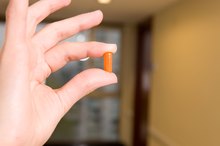What does fact checked mean?
At Healthfully, we strive to deliver objective content that is accurate and up-to-date. Our team periodically reviews articles in order to ensure content quality. The sources cited below consist of evidence from peer-reviewed journals, prominent medical organizations, academic associations, and government data.
- National Institutes of Health Office of Dietary Supplements: Vitamin B12 Quick Facts
- MedlinePlus Medical Encyclopedia; Vitamin B12; Feb. 15, 2011
The information contained on this site is for informational purposes only, and should not be used as a substitute for the advice of a professional health care provider. Please check with the appropriate physician regarding health questions and concerns. Although we strive to deliver accurate and up-to-date information, no guarantee to that effect is made.
B12 Levels in Skim Milk
Your body needs vitamin B-12 to produce red blood cells, synthesize DNA and maintain proper neurological function and a healthy central nervous system. Insufficient B-12 intake or absorption can cause vitamin B-12 deficiency anemia, or a lack of healthy red blood cells. Milk and other animal products provide good dietary sources of vitamin B-12.
B-12 in Skim Milk
Skim milk, a nonfat alternative to other milks, provides a good source of vitamin B-12. A 1-cup serving of skim milk provides 1.23 micrograms of vitamin B-12. This amount provides 20.5 percent of the FDA’s recommended Daily Value, or DV, of 6.0 micrograms of vitamin B-12.
Comparison
Vitamin B12 Deficiency & Numb Fingers
Learn More
Skim milk provides slightly more vitamin B-12 than whole milk and reduced-fat milk. A 1-cup serving of 1 percent milk provides 1.15 micrograms of vitamin B-12, and a 1-cup serving of whole milk provides only 1.10 micrograms. The B-12 in 1 percent milk and whole milk provides 19.2 and 18.3 percent, respectively, of the recommended DV for this vitamin.
Other B-12 Food Sources
Other good sources of B-12 include:
- chicken
- crab
- salmon
- sardines
- trout
- fortified breakfast cereals
If you are vegan, you can get vitamin B-12 from dietary supplements, yeasts or fortified foods 1. According to McKinley Health Center, the B-12 in fortified foods is made with the B-12 bacteria and not animal products.
B-12 Deficiency Symptoms
Signs & Symptoms of Vitamin B-12 & Vitamin D Deficiencies
Learn More
Vitamin B-12 deficiency, or a lack of healthy red blood cells, can lead to megaloblastic anemia with symptoms such as:
- weakness
- fatigue
- weight loss
- constipation
- sore tongue
- pale skin
- reduced appetite
- difficulty concentrating
Severe or prolonged B-12 deficiency may lead to neurological symptoms such as depression, confusion, loss of balance, memory problems and dementia. Prolonged B-12 deficiency can also cause nerve damage with symptoms such as tingling and numbness in hands and feet. Consult your doctor if you suspect you have vitamin B-12 deficiency. You may have an underlying health condition that hinders your body’s ability to absorb B-12 from food.
- Vitamin B-12 deficiency, or a lack of healthy red blood cells, can lead to megaloblastic anemia with symptoms such as: * weakness
* fatigue
* weight loss
* constipation
* sore tongue
* pale skin
* reduced appetite
* difficulty concentrating Severe or prolonged B-12 deficiency may lead to neurological symptoms such as depression, confusion, loss of balance, memory problems and dementia. - Prolonged B-12 deficiency can also cause nerve damage with symptoms such as tingling and numbness in hands and feet.
Related Articles
References
- National Institutes of Health Office of Dietary Supplements: Vitamin B12 Quick Facts
- MedlinePlus Medical Encyclopedia; Vitamin B12; Feb. 15, 2011
- U.S. National Library of Medicine. MedlinePlus. Vitamins. Reviewed February 2, 2019.
- U.S. National Library of Medicine. MedlinePlus. Vitamin D Deficiency.
- U.S. National Library of Medicine. MedlinePlus. Vitamin B12 deficiency anemia. Reviewed January 19, 2018.
- U.S. National Library of Medicine. MedlinePlus. Pellagra. Reviewed October 12, 2018.
- National Institute of Neurological Disorders and Stroke. Restless Legs Syndrome Fact Sheet.
- Vici G, Belli L, Biondi M, Polzonetti V. Gluten free diet and nutrient deficiencies: A review. Clin Nutr. 2016;35(6):1236-1241. doi:10.1016/j.clnu.2016.05.002
- Wacker M, Holick MF. Sunlight and Vitamin D: A global perspective for health. Dermatoendocrinol. 2013;5(1):51-108. doi:10.4161/derm.24494
- Crohn’s & Colitis Foundation. Vitamin and Mineral Supplementation.
- Foundation for Peripheral Neuropathy. Vitamin B12 Deficiency Neuropathy.
- U.S. National Library of Medicine. MedlinePlus. Vitamin B Test. Updated May 28, 2019.
- International Foundation for Gastrointestinal Disorder. Malabsorption.
- Diab L, Krebs NF.Vitamin Excess and Deficiency.Pediatr Rev. 2018 Apr;39(4):161-179. doi: 10.1542/pir.2016-0068.
- Thomas-Valdés S, Tostes MDGV, Anunciação PC, da Silva BP, Sant'Ana HMP.Association between vitamin deficiency and metabolic disorders related to obesity.Crit Rev Food Sci Nutr. 2017 Oct 13;57(15):3332-3343. doi: 10.1080/10408398.2015.1117413.
Writer Bio
Lisa Porter began writing professionally in 2009. She writes for various websites and has a Bachelor of Arts in English literature.









